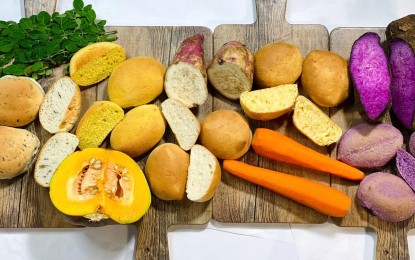
ALTERNATIVE INGREDIENTS. The leadership of the Asosasyon ng Panaderong Pilipino on Monday (July 24, 2023) said more local agriculture products should be used in the production of bread. Squash, carrots, sweet potatoes and malunggay (moringa) are offered as substitutes or additives to flour. (Photo by Pot Chavez)
CUENCA, Batangas – The community bakery sector here welcomed the high importance the incumbent administration has placed on food security goals, as made evident in President Ferdinand R. Marcos, Jr.’s second State of the Nation (SONA) address.
The group Asosasyon ng Panaderong Pilipino (APP), which is ceremonially based in this town, said its nationwide membership is willing to support the President’s program, by using more locally-sourced raw materials to produce affordable bread for financially-struggling Filipinos.
In an interview on Monday, APP president Lucito Chavez said Filipino bakers working together can help advance the government’s food security objectives while simultaneously strengthening the agriculture sector.
“If every baker in the country can be assisted by the government, we expect great contributions to the country's food security, especially those bakers from the town of Cuenca in Batangas, who are well-known 'pandesal' makers, that is almost the 'national bread' of the country,” he noted.
Chavez pointed out that through a possible partnership with the Department of Agriculture (DA), “bakers can make use of the local agricultural products in the country to make bread.”
Local bakeries have traditionally relied on imported ingredients for their products, but dependence on raw materials sourced overseas can be cut significantly with the use of indigenous alternatives, APP’s president explained.
“Through this, Filipino bakers will have new products while Filipino farmers will have buyers for their crops. This Nutrition Month, I hope we can promote the campaigns of using nutritious agricultural products in Philippine baking,” he added.
Food security, as defined by the 1996 World Food Summit, means that “all people have physical and economic access to sufficient, safe, and nutritious food that meets their dietary needs and food preferences for an active and healthy life.”
Further, Chavez said he is hopeful that the industry of sugar, salt and other ingredients in bread production be further developed so Filipino bakers can make use of locally-sourced baking ingredients and develop a “real Filipino bread.”
For his part, Cuenca Mayor Alex Magpantay, himself a baker by trade, said “I am appealing to the national government to control the price of the two basic ingredients being used in the process of bread making – flour and sugar.”
He urged the Marcos administration to “institutionalize the baking industry by enacting the necessary laws to support bakers and other industry stakeholders.”
Cuenca is set apart by its unusually high number of bakers in a relatively small town, most of which belong to the small- and medium-scale category, often referred to as “community bakers.”
Meanwhile, Dr. Frederick Rey, a political sociologist, said “all actors in the food industry or food security agenda must have a unified vision that they are all protected by the government, emphasizing general welfare.”
He recognized the innovative programs launched by the DA since Marcos took the helm.
“There are many beautiful and innovative programs in the short term of the president in the DA such as the food stubs that are given out, those are initiatives that can provide relief. We are looking forward to expanding this program,” Rey told the Philippine News Agency (PNA).
He noted that the concept of Kadiwa centers serves as a model for implementing a true people’s market.
However, he said this approach must be “holistic so no sector may be marginalized like middlemen who may lose their income.” (PNA)
